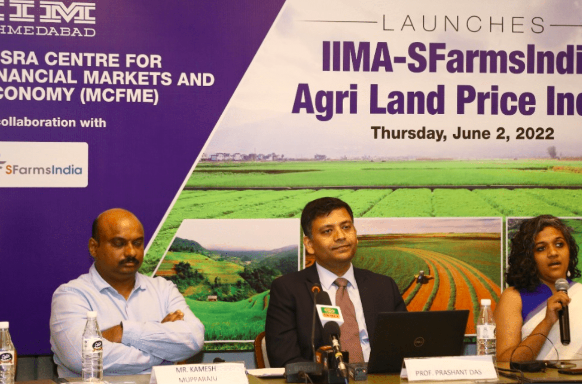IIM Ahmedabad launches India’s First Ever Agri Land Price Index In Collaboration With SFarmsIndia

JThe Indian Institute of Management Ahmedabad (IIMA), a premier global management institute, in collaboration with India’s first agri-land marketplace SFarmsIndiahas announced the launch of IIMA-SFarmsIndia Agri Land Price Index (ISALPI), a first-of-its-kind land price index that will record an¬¬¬d present ‘quality controlled’ data of prices of agricultural landacross the country. This index is particularly important in terms of benchmarking land prices in rural and semi-urban areas. In such a case, the index will serve as a reliable source that will signal potential conversion of agricultural land into real estate.
Unlike financial assets, developing an index for land parcels is a complex task because of visible price differences in different listings caused by a slew of factors including the market wide supply-demand factors. The method adopted for the preparation of ISALPI addresses these disparities and ensures accuracy. ISALPI has been put together using the regression-based hedonic pricing methods.
The Misra Centre for Financial Markets and Economy at IIMA, under which this index is being launched, will be hosting this index on its official website. The Centre is committed to creating and disseminating new knowledge and insights about various facets of the Indian financial markets and economy.
Speaking of the relevance of the index in the current scenario,Professor Errol D’Souza, Director IIMAsaid: “With just over 200 million hectares, India houses just 2% of the world’s cropped land; but feeds over 15% of the world’s population.
Recently, we have witnessed a surge in entrepreneurial interest in Agri land and allied professions: From agricultural engineering to precision farming, from food technology to supply chain management and green energy. We believe it is the right time to launch such an index for India. With ISALPI, we hope to build better data sources for all stakeholders to be able to take informed decisions at national as well as regional levels and support the agribusiness activities.”
Currently ISALPI is based on land listing data from six states: Andhra Pradesh, Karnataka, Maharashtra, Tamil Nadu, Telangana, and Uttar Pradesh. With the arrival of more data from other states of India, the index could be more valuable in two ways. First, it will offer superior representation of the national context. Second, it will offer a more granular index at regional levels.
In addition, this index can greatly benefit stakeholders across the spectrum including policy makers, local governments, environmentalists, investors, real estate developers and financiers.For instance, the index can be used by local governments to compensate thepeople who lose land for highway expansion.
Further elaborating on the utility of the index, project lead and associate professor of Real Estate Finance at IIMA, Dr Prashant Das,said, “Investors could use this information to assess the historical risk and return in the past and predict these metrics for the future to decide on their investment positions. Fund managers and producers could use this information to broadly benchmark their own performance . Financiers and insurers could use this information to assess the risk in the company related to the asset class reflected in the index. Researchers could use this information to study how economic events and factors are associated with price movements in a specific asset class. Policy makers (e.g. the Central bank) may use it to modulate their policies.”
Mr. Kamesh Mupparaju, the CEO of SFarmsIndia said: “SFarmsIndia has a strong focus on data warehousing and mining aimed at bringing cutting-edge agri-realty domain specific AI capabilities to the market. The collaboration with IIMA to develop an Agri-land price index (ISALPI) is an important step in this regard.”
The Misra Centre for Financial Markets and Economy at IIMA is a Centre of Excellence, conducting research on the Financial Markets and Economy in India. This Centre is expected to provide impetus for focused research and teaching related to financial markets within the overall economic framework.




